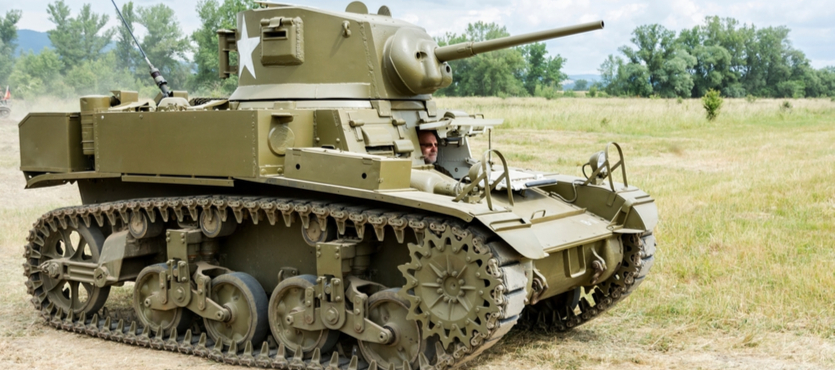One of the world’s largest defense contractors agreed to build 96 next-generation light tanks for the U.S. Army. The initial contract is worth $1.14 billion.
Beginning in 2018, the Army tested about two dozen prototypes before settling on the GD light tank. Because of the COVID-19 pandemic, final testing at Fort Bragg did not happen until 2021. By August of that year, the soldiers had completed their evaluation, following which the prototypes went through limited user testing, which included live-fire systems. After considering the costs involved and the readiness of production, the U.S. Army Future Command picked GD as the winner of the contract.
The monster deal may be only the beginning, as the AFC expects to keep buying these tanks until at least 2035.
What Contractors Do
U.S. law sharply limits the activities of private military contractors, which is the main reason the United States has not signed international agreements regulating mercenaries. These regulations already exist in U.S. law, so international oversight is basically overkill. Although the roles of overseas military contractors are limited, their roles are vital.
Maintaining
Many people believe that private military contractors are a little like French Foreign Legion fighters, in that they are poorly qualified, poorly trained, of questionable character, and basically not much more than thugs with machine guns.
Reality is a lot different. Many private military contractors are employees of General Dynamics and other defense contractors who build highly-sophisticated weapons systems. The light tanks in the above article will replace the Abrams fighting vehicles, which entered service in 1979. The Mobile Protected Firepower (MPF) tank “represents a new capability for the Army, allowing our light maneuver forces to overmatch adversaries. Through multiple soldier touchpoints, our soldiers have operated the prototypes and provided crucial feedback to the design team, ensuring our forces will have the asset they need on the future battlefield,” remarked Maj. Gen. Ross Coffman.
Let’s translate the General’s remarks into English. The new MPF tank has enhanced armor, a lighter and more powerful motor, sophisticated scanners, and a lot of firepower. Additionally, the MPF is much easier to operate. The Abrams was basically a souped-up armored car. The MPF is so much more. This light tank also has a substantial coolness factor which appeals to the kids.
General Dynamics’ initial contract may just be the first installment. The DoD estimates the total cost of this program will be about $25 billion.
Fancy equipment often breaks down. In many cases, the same GD employees who designed and built the MPFs will maintain these vehicles in the field.
Training
In a nutshell, commanders hope that MPF tanks help end foreign conflicts sooner. In the end, that is what everyone wants.
Maintaining equipment is critical to this mission. Training government security forces may be even more important. This idea pre-dates the Abrams Tank. In 1969, shortly after he took office, President Richard Nixon gave his famous vietnamization speech.
“I want to end the war to save the lives of those brave young men in Vietnam. But I want to end it in a way which will increase the chance that their younger brothers and their sons will not have to fight in some future Vietnam someplace in the world,” he said in a televised address.
As it turns out, this approach did not work so well back then. Now, private military contractors often take charge of such efforts. So, the outcome is usually different.
Private military contractors instill more than basic military discipline. As mentioned, these individuals are highly-qualified soldiers who know what it means to follow orders with a conscience and know what it takes to survive in combat. Additionally, contractors know a lot about intelligence gathering and other anti-insurgency activities that military academies and drill sergeants do not teach.
This responsibility does not end when the shooting stops. Contractors also play pivotal roles in other rebuilding and nation-building efforts. For example, private contractors are usually the point guards in large construction projects. So, they help fulfill the true intent of vietnamization.
Supporting
The aforementioned U.S. laws make private military contractors accountable for their actions in American courts. Mercenaries are usually above the law. Additionally, U.S. rules prohibit private military contractors from participating in offensive operations. However, that does not mean they are never on the front line.
In terms of combat operations, contractors often do things like escort supply convoys, protect strongpoints, and escort VIPS on inspection tours. These responsibilities may seem insignificant, and may seem like they contribute little to the overall war effort. However, every soldier that is not on guard duty is probably engaging the enemy. So, support contractors contribute directly to offensive prowess.
Injury Compensation Available
Contractors in all these areas face roughly the same injury risks. That is why the Defense Base Act is available to compensate all injured contractors, regardless of their duties.
In fact, the injury or occupational disease need not be directly related to their deployments. Courts have consistently held that DBA victims must only establish a nexus, or an indirect link, between their injuries and their deployments.
Assume Tina, who was stationed in Syria, was in a street market when a suicide bomber blew himself up. Tina sustained a head injury and numerous other injuries. Although she technically was not on duty at the time, DBA compensation is usually available.
Furthermore, the DBA does not just apply in active war zones, like Syria. It also applies in inactive war zones. The only requirement is that the country have some U.S. military presence. An advisor in an embassy fits the bill.
DBA benefits include lost wage replacement and medical bill payment. Most injured victims are entitled to two-thirds of their average weekly wage for the duration of their disabilities. The medical bill payment benefit applies to all reasonably necessary medical expenses.
For more specific information about DBA benefits, contact Barnett, Lerner, Karsen, Frankel & Castro, P.A.

